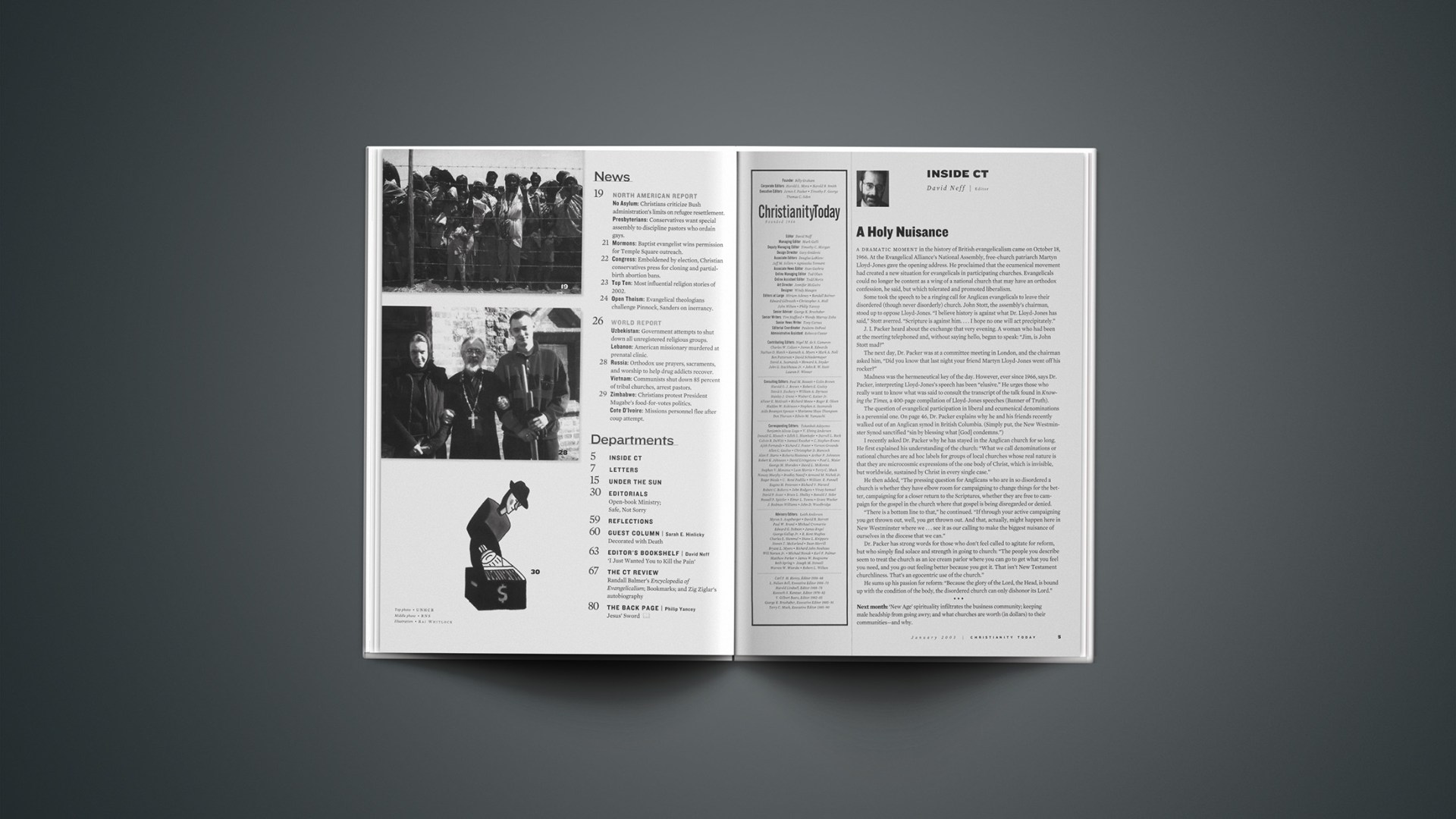A dramatic moment in the history of British evangelicalism came on October 18, 1966. At the Evangelical Alliance's National Assembly, free-church patriarch Martyn Lloyd-Jones gave the opening address. He proclaimed that the ecumenical movement had created a new situation for evangelicals in participating churches. Evangelicals could no longer be content as a wing of a national church that may have an orthodox confession, he said, but which tolerated and promoted liberalism.
Some took the speech to be a ringing call for Anglican evangelicals to leave their disordered (though never disorderly) church. John Stott, the assembly's chairman, stood up to oppose Lloyd-Jones. "I believe history is against what Dr. Lloyd-Jones has said," Stott averred. "Scripture is against him … I hope no one will act precipitately."
J. I. Packer heard about the exchange that very evening. A woman who had been at the meeting telephoned and, without saying hello, began to speak: "Jim, is John Stott mad?"
The next day, Dr. Packer was at a committee meeting in London, and the chairman asked him, "Did you know that last night your friend Martyn Lloyd-Jones went off his rocker?"
Madness was the hermeneutical key of the day. However, ever since 1966, says Dr. Packer, interpreting Lloyd-Jones's speech has been "elusive." He urges those who really want to know what was said to consult the transcript of the talk found in Knowing the Times, a 400-page compilation of Lloyd-Jones speeches (Banner of Truth).
The question of evangelical participation in liberal and ecumenical denominations is a perennial one. On page 46, Dr. Packer explains why he and his friends recently walked out of an Anglican synod in British Columbia. (Simply put, the New Westminster Synod sanctified "sin by blessing what [God] condemns.")
I recently asked Dr. Packer why he has stayed in the Anglican church for so long. He first explained his understanding of the church: "What we call denominations or national churches are ad hoc labels for groups of local churches whose real nature is that they are microcosmic expressions of the one body of Christ, which is invisible, but worldwide, sustained by Christ in every single case."
He then added, "The pressing question for Anglicans who are in so disordered a church is whether they have elbow room for campaigning to change things for the better, campaigning for a closer return to the Scriptures, whether they are free to campaign for the gospel in the church where that gospel is being disregarded or denied.
"There is a bottom line to that," he continued. "If through your active campaigning you get thrown out, well, you get thrown out. And that, actually, might happen here in New Westminster where we. … see it as our calling to make the biggest nuisance of ourselves in the diocese that we can."
Dr. Packer has strong words for those who don't feel called to agitate for reform, but who simply find solace and strength in going to church: "The people you describe seem to treat the church as an ice cream parlor where you can go to get what you feel you need, and you go out feeling better because you got it. That isn't New Testament churchliness. That's an egocentric use of the church."
He sums up his passion for reform: "Because the glory of the Lord, the Head, is bound up with the condition of the body, the disordered church can only dishonor its Lord."
***Next month: 'New Age' spirituality infiltrates the business community; keeping male headship from going awry; and what churches are worth (in dollars) to their communities—and why.
Copyright © 2003 Christianity Today. Click for reprint information.
Related Elsewhere
Articles also appearing on our site today include:
Why I Walked | Sometimes loving a denomination requires you to fight.
Previous Christianity Today articles on the Diocese of Westminster debate include:
Mortified in Vancouver | A church's actions can be in conflict with its professed faith only so long before faithful Christians wonder how much hypocrisy they can stand. (July 30, 2002)
Anglican Diocese Endorses Same-Sex Unions | Traditionalists walk out, issue global call for outside intervention. (July 12, 2002)
Vancouver Anglicans Approve Same-Sex Unions | Conservatives walk out after synod vote to bless gay couples. (June 17, 2002)
To learn more about J.I. Packer, read Christianity Today's "Knowing Packer: The lonely journey of a passionate Puritan" by Wendy Murray Zoba or "The Last Puritan" by Mark Noll.
Previous Christianity Today articles by Packer include:
Text Criticism and Inerrancy | How can I reconcile my belief in the inerrancy of Scripture with comments in Bible translations that state that a particular verse is not 'in better manuscripts'? (Oct. 22, 2002)
Hell's Final Enigma | Won't heaven's joy be spoiled by our awareness of unsaved loved ones in hell? (April 4, 2002)
Wisdom in a Time of War | What Oswald Chambers and C.S. Lewis teach us about living through the long battle with terrorism. (January 4, 2002)
Is Satan Omnipresent? | If not, how does he tempt many people at one time?
Still Surprised by Lewis | Why this nonevangelical Oxford don has become our patron saint. (Sept. 7, 1998)
Thank God for Our Bibles | While Scripture comes in many flavors today, we can still trust these translations to give us God's Word. (Oct. 27, 1997)
Our Lifeline | The Bible is the rope God throws us in order to ensure that we stay connected while the rescue is in progress. (Oct. 28, 1996)










